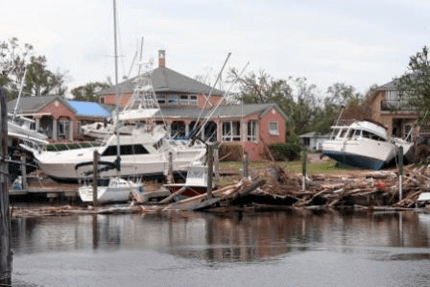Before The Storm Hits...
Hurricane season has begun and we know that where there's a hurricane, there's definitely water damage and the need for emergency services to mitigate the damage and restore homes and businesses. Many home and business owners think that they are prepared because they have insurance.
Every year billions of dollars are spent on emergency services when natural disasters occur. In fact, a recent U.N. study indicated that economic losses from disasters since 2000 are in the range of $2.5 trillion, a figure 50% higher than previous international estimates. And insurance only goes so far in covering damages. To limit damage to your home or business, here are our "Top 10" tips to be storm ready:
- Insurance - review insurance policies as some have separate deductibles for various perils like flood, wind, lightning, etc. Flooding requires a separate insurance policy and can be complicated. Review your policy for a mitigation clause which may require you to do whatever is in your power to make sure the damage does not get any worse.
- Documentation - take inventory of valuables, personal property, or assets, both individual and company-owned. One of the best ways to do this is with video or digital photos. Keep a set of them in a safe, secure location away from your property.
- Communication - how will everyone communicate in the chaos of a severe storm? Plan a solution ahead of time so that everyone is on the same page. Be prepared to use a car charger to recharge your cell phone. In the event of a power outage, a battery-powered AM/FM radio or television will help to stay updated on events.
- Basic Emergency Supply Kit - water; one gallon per day for at least 3 days, a three-day supply of food, flashlight with batteries, First Aid Kit, small tools, a manual can opener, charged cell phone, and enough medication for three days. Don't forget to plan for your pets
- Water Damage - it is important to try and start the drying process as soon as possible. Make sure you have a dehumidifier or Shop-Vac that can help. And have the telephone number of a qualified water restoration company handy. Related article: How to Deal with Water Damage in Your Home
- Emergency Services - make plans to secure your property. Have pre-cut plywood for window board-up and several different sizes of tarps with hammer and nails. Cover all windows since tape does not prevent windows from breaking. Reinforce garage doors since if wind enters a garage it can cause dangerous and expensive structural damage. Invest in a backup generator in case you lose power.
- Trimming - cut down shrubs and branches that could break windows, tear down power lines, or damaged roofing.
- Outside Objects - bring in outside objects like furniture, decorations, garbage cans, or toys that could become projectiles in heavy winds.
- Cleaning - clean loose and clogged rain gutters and downspouts.
- Evacuation - learn your community's evacuation routes and make sure that you have a full tank of gas. If possible, safely store extra gas or propane. Know the location and information for your community shelter. Decide on a family meeting place outside the home in case the home is inaccessible.
Click Here To Download Our Hurricane Check List Click Here To Download Our Hurricane Clean-Up Safety TipsWe hope you find these tips useful. For more helpful information about natural disasters and emergencies, please visit FEMA's website. And know that if you or your business need help from a natural disaster, ServiceMaster Dynamic Cleaning is available to help 24/7/365. Call us at (800) 865-5157 or click www.smdynamic.com.



